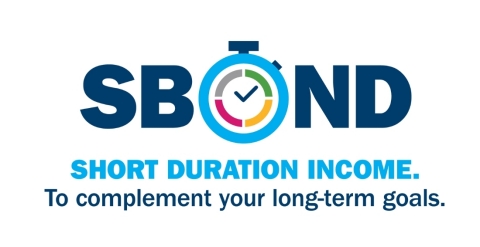Columbia Threadneedle Investments Expands Strategic Beta Fixed Income Suite with Launch of Columbia Short Duration Bond ETF (SBND)
Columbia Threadneedle Investments has launched the Columbia Short Duration Bond ETF (NYSE Arca: SBND), expanding its fixed income ETF offerings. This ETF focuses on generating income across four debt market segments, including U.S. investment-grade corporates and high yield, while minimizing credit risk. SBND utilizes a rules-based investment approach to maintain income without sacrificing yield despite lower duration. The fund is managed by a team of experienced portfolio managers and is competitively priced at 25 basis points.
- Launch of SBND enhances income opportunities in a challenging interest rate environment.
- Utilizes a rules-based strategy to reduce duration risk while capturing higher income opportunities.
- Provides diversified exposure across multiple fixed-income segments.
- None.

SBND seeks to broaden investors’ income opportunity set by tracking an index resulting in a short-duration portfolio that does not sacrifice yield or take on excessive credit risk. The ETF aims to provide investors with a diversified portfolio of fixed income securities across four income-producing debt segments –
"In a challenging interest rate environment, investors may need to adjust their fixed income allocations and broaden their income opportunity set," said
“Against a backdrop of market uncertainty, we’ve seen investors increasingly use short-term bond funds to simply ‘park’ their assets until they decide what to do next,” added
The launch of SBND adds another compelling fixed income strategic beta solution to a lineup that includes Columbia Diversified Fixed Income Allocation ETF (DIAL), launched in 2017, and Columbia Multi-Sector Municipal Income ETF (MUST), launched in 2018. DIAL is a multi-sector bond strategy that targets more consistent income in any market with a rules-based approach that goes beyond the traditional bond market benchmark. SBND complements DIAL in providing investors with a short-duration version of a proven diversified bond strategy. MUST targets higher tax-exempt income and risk-adjusted returns than traditional municipal bond benchmark funds by strategically diversifying across five municipal bond sectors.
All three funds are managed by active fixed income investors whose expertise and insights informed the rules-based approach that underpins each ETF and reflect a commitment to delivering fixed income solutions to meet a variety of investor needs. SBND is managed by
About Columbia Threadneedle Investments
Columbia
Columbia
Columbia
1 Survey of 221 financial advisors conducted
2 As of
Investors should carefully consider the investment objectives, risks, charges and expenses of the Fund before investing. To obtain a prospectus containing this and other important information, please call 888 800 4347 or visit columbiathreadneedleus.com/etf to view or download a prospectus. Read the prospectus carefully before investing.
Fixed income securities involve interest rate, credit, inflation, illiquidity and reinvestment risks. Interest rate risk is the risk that fixed income securities will decline in value because of changes in interest rates. Generally, the value of debt securities falls as interest rates rise. Fixed income securities differ in their sensitivities to changes in interest rates. Fixed income securities with longer effective durations tend to be more sensitive to changes in interest rates, usually making them more volatile than securities with shorter effective durations. Effective duration is determined by a number of factors including coupon rate, whether the coupon is fixed or floating, time to maturity, call or put features, and various repayment features. Below investment-grade securities, or “junk bonds,” are more likely to pose a credit risk, as the issuers of these securities are more likely to have problems making interest and principal payments than issuers of higher-rated securities. Lower-rated securities may be more susceptible to real or perceived adverse economic and competitive industry conditions than higher-grade securities, and prices of these securities may be more sensitive to adverse economic downturns or individual corporate developments. If the issuer of the securities defaults, the ETF may incur additional expenses to seek recovery. Mortgage- and asset-backed securities are affected by interest rates, financial health of issuers/originators, creditworthiness of entities providing credit enhancements and the value of underlying assets. Generally, rising interest rates tend to extend the duration of fixed rate mortgage-related securities, making them more sensitive to changes in interest rates. As a result, in a period of rising interest rates, if the ETF holds mortgage-related securities, it may exhibit additional volatility. In addition, adjustable and fixed rate mortgage-related securities are subject to prepayment risk. The fund is passively managed and seeks to track the performance of an index. The fund’s use of a “representative sampling” approach in seeking to track the performance of its index (investing in only some of the components of the index that collectively are believed to have an investment profile similar to that of the index) may not allow the fund to track its index with the same degree of accuracy as would an investment vehicle replicating the entire Index. Foreign investments subject the fund to risks, including political, economic, market, social and others within a particular country, as well as to currency instabilities and less stringent financial and accounting standards generally applicable to
ETF shares are bought and sold at market price (not NAV) and are not individually redeemable. Investors buy and sell shares on a secondary market. Shares may trade at a premium or discount to the NAV. Only market makers or "authorized participants" may trade directly with the Fund(s), typically in blocks of 50,000 shares.
The Beta Advantage® Short Term Bond Index is a fixed weight composite index that blends six custom sub-indices based off the following Bloomberg flagship indices: US Corporate, US High Yield, US MBS, US CMBS, US ABS, and the EM USD Aggregate. It is not possible to invest directly in an index.
AdTrax: 3766112
ALPS: CET001387
View source version on businesswire.com: https://www.businesswire.com/news/home/20210921005107/en/
617.897.9343
liz.kennedy@ampf.com
Source: Columbia Threadneedle Investments
FAQ
What is the Columbia Short Duration Bond ETF (SBND)?
When was the Columbia Short Duration Bond ETF (SBND) launched?
How does the SBND ETF approach fixed income investment?
What is the expense ratio of the Columbia Short Duration Bond ETF (SBND)?







